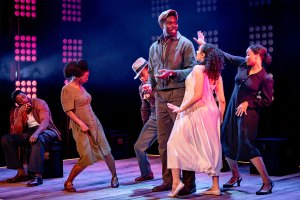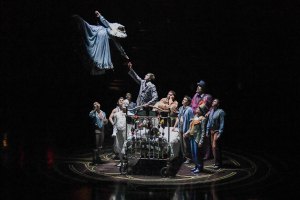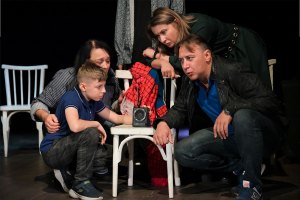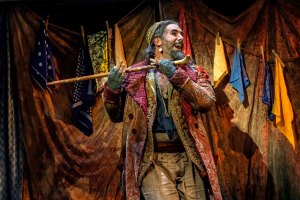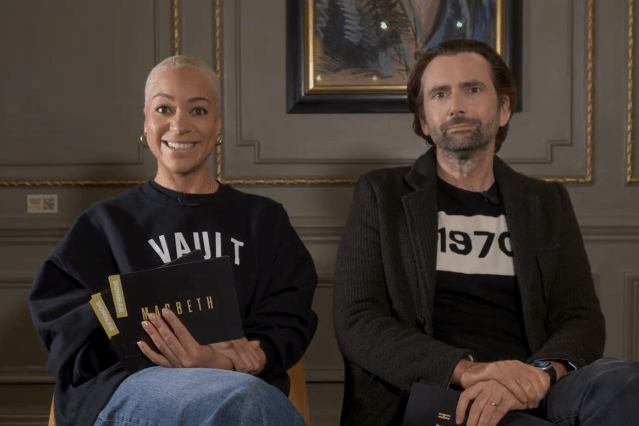The Making of Marguerite
The world premiere of an original musical is a rare event in the West End, but Marguerite, co-written by Michel Legrand & the creators of Les Misérables, opens next at the Theatre Royal Haymarket. How is a new musical brought to life? Roger Foss meets members of the creative team to find out how they’ve been putting it together.
ALAIN BOUBLIL – Book & original French lyrics
Michel Legrand and myself hail from the sung-through format – even Michel’s The Umbrellas of Cherbourg was a sung-through musical movie. Once we had established the concept of Marguerite as an update of La Dame aux Camelias set in the dark hours of Nazi-occupied Paris in 1942, we immediately knew that parts of this story could not and should not be sung, except at the appropriate moments in the unfolding story.
The original idea of updating La Dame aux Camelias was Claude-Michel’s and I chose the period. However, I had written on my own two or three versions of the script, finding none of them satisfactory, until I asked Claude-Michel to join me in the writing of the book. At that stage Jonathan Kent, who was later to write the English version of the book and dialogue as well as directing, had already been working with me for some time and with his encouragement Claude-Michel and I must have written about six more versions. Then I went through more versions of the French lyrics before we recorded the first demo of the piece in French, with Michel playing piano and singing Armand and Marguerite, Claude-Michel doing Otto, the German general, and the three of us playing book scenes, as well as singing the company numbers.
We always thought that Marguerite herself should be a 40-year-old-woman falling in love with Armand, a young jazz musician, who would be half her age. We broadly drew Armand from Michel Legrand himself at 20, already a very successful musician in St German des Près. Next, I asked Herbert Kretzmer if he would consider writing the English lyrics as I felt that after our collaboration on Les Miserables, he would have a particular feel for this.
Claude-Michel and I are driven, I mean addicted, to creating original musicals with a new story and original music and lyrics. Michel is one of the few musical geniuses alive with whom Claude-Michel and I could consider sharing just such a unique experience; and all of us can’t wait to share these years of hard work and intense pleasure with an audience.
CLAUDE-MICHEL SCHÖNBERG – Book
The first question that anybody asks me as a composer is if it’s a frustration not to be writing the music for Marguerite. Well, because of my admiration for Michel Legrand and my long association with Alain, there is no frustration at all.
I’ve written the book based on harsh fact. Marguerite is a privileged courtesan doing well out of the Nazi occupation, which was a dark time in French history for 98 percent of the population. It was a time of collaboration and corruption. French businessmen became franc billionaires and missed out nothing while the rest of the population was starving. Even Joseph Goebbels told Hitler that German officers shouldn’t stay in Paris for more than two months because they became totally corrupted by the city and the women.
But you don’t write a musical, you rewrite a musical. It’s the only way we know how to work. Each day, if we see something is wrong, we work on it – one week before the opening night we will still be working on it. Alain and me give blood and tears on all our projects, even on The Pirate Queen, which was a failure on Broadway. Everything challenges when you are not on the safe side of the road and not using someone from TV who is trying to be the next star. In 2008, we are still fighting against all of that.
HERBERT KRETZMER – English lyrics
Over the last 30 or 40 years I have, as a lyricist, written dozens of songs and a couple of shows which had their origin in the French language – Les Miserables, for instance, plus a host of lyrics written for and with Charles Aznavour. It comes as a surprise to many that I don’t even speak French, beyond an elementary “ou-est-le Eiffel Tower” kind of tourist French.
I never go to work on my “French” songs until I have been supplied with a straightforward, word-for-word translation of the original, and I take it from there. It goes without saying that I remain ever at the service of the original meaning and thrust of the song. But what I do precisely is not easily described. I use the original, already translated text as a road map, a house plan, a blueprint. It tells me where the song’s narrative line is heading – it tells me what is happening, and who is making it happen. Thus armed, I head off in the same direction, preserving, where I can, any particularly catchy key words and images from the initial text. Sometimes, when the story allows it, I depart entirely from the original. There is no such thing as an “easy” song to write for Marguerite. Some lyrics may sound easy and simple, but need days and even weeks to complete.
All languages have their own resonances and subliminal meanings, peculiar to that language. As an English lyricist, I am addressing myself to a separate language-group, a different culture. All that matters is that we all – the creative team – tell the same story, at the same pace, and that we arrive at the finishing line at the same time.
JONATHAN KENT – Book & direction
I’ve directed opera and a revival of Man of La Mancha on Broadway, but never a completely original musical. Because of its short scenes and intense emotional journey, Marguerite is not easy to stage. My main challenge has been to ensure that everything coheres, so that it has a dramatic arc, a logic and coherence, which is difficult to achieve. Music, lighting, design, musical staging, performances – everything has to be brought into the same sphere. Early on, during the workshop process, there were some clear-cut changes to make – putting in a new song, cutting scenes, rewriting some entirely. But the great thing about collaborating with Michel, Alain and Claude-Michel is that they are masters of their field. They know how to put musicals together. It’s been an education.
As director, I guess I hold everything together. I’m the focus for all the creatives. I’m rehearsing with the actors, working with stage management, the company manager, musical supervisor, PR and marketing people, and a team of backstage staff. But I have one big advantage as a director. I’ve worked on productions with so many of our production team over the years, which means we trust and support each other. In the end, I have to focus all of our minds on telling a story about people living through a shocking period in French history – a great love affair set against dark times, in the same way that Casablanca is set against the war.
PAUL BROWN – Design
In Marguerite, the explosive point from which everything else springs is Marguerite and Armand’s first kiss. So we decided on a setting that reflects a sophisticated but fragile world of glass and mirrors where the instant their passion explodes, the glass shatters and can’t ever be mended, leading to her inevitable decline.
Designwise, this is a complicated and ambitious show to put on, given the time and money available, which means being as careful with costs as we can without cheating the audience. The big challenge is creating a set that allows the flashback action to move cinematically between various Parisian locations and back to the apartment where Marguerite lives with Otto, her Nazi general, and where she ends up dying. Like the other two multi-scene pieces in the Haymarket season, the big problem is finding ingenious ways of overcoming the limited wing space behind the theatre’s grand proscenium.
Actually, as a designer it’s a constraint that you embrace and enjoy. I tend to do costumes for my shows and this one is interesting because the French collaborators weren’t wearing wartime austerity clothing. If you look at footage of the time, they were clearly leading an elite lifestyle. I’ve plundered vintage clothes shops, some costumes have been specially made, others are modern. We’ve been lucky because there’s a lot of Forties influence in the high street at the moment, so we saved money that way.
SEANN ALDERKING – Orchestrations & arrangements
I have two jobs. As music supervisor, I’m responsible for everything musical in the show and for teaching everyone how the music works, including the musical director, John Rigby, who conducts each performance. Having worked on the orchestrations with Michel Legrand, I know what he wants from the musical standpoint. As orchestrator, I took his original piano score and blew that up for 12 musicians. Not that Michel can’t do that: he’s written hundreds of film scores and orchestrated every single one himself.
We got along so well working side by side at the piano on more than 20 numbers in the show, including reprises. While I’d be doing the woodwind parts, he’d be on the strings. Orchestrating is usually a solitary occupation. It was nice to share it. I’ve tried to create a 1940s Parisian “sound world”. There’s a nostalgic number called “Time Was When” that everyone says is so French when they first hear it. Musically, it’s specifically designed to sound like Paris, but it’s hard to say how you achieve this. You can evoke “French” without bringing in an accordion.
ARNOLD M CROOKE – Chairman of the Theatre Royal Haymarket
I’m not involved artistically with Marguerite. We’re happy to leave that part of the production in the capable hands of the brilliant creative team. My job, with Nigel Everett, director of the theatre, is to consider, with our backers, the commercial risk involved in producing the world premiere of an original musical in an 898-seat West End theatre.
There is always risk in producing, whether it’s a play or musical, but a musical can cost many times more than an average play, depending on the scale of the production – and ours is the only commercial theatre in the heart of the West End to create its own in-house season, investing some £3 million into the project. Budgeting a musical to run for part of the season means ticket prices have to be slightly higher (£25-£60) than for the two plays in the season just to break even, but if it succeeds, the rewards are greater than a play.
Judging from the attendances and feedback, our first season has been extremely successful. And we are proud to have included students from our new Masterclass apprentice training programme, who have been assigned in paid positions to assist the season’s director, Jonathan Kent, and have also understudied actors in all three productions. We’re planning a second Haymarket season to follow Marguerite at the end of its six-month run. We’re having discussions at the moment with other possible artistic directors and I hope, when these are concluded, we will be able to continue this winning format.
Marguerite receives its world premiere on 20 May 2008 (previews from 7 May) at the West End’s Theatre Royal Haymarket, where it’s booking until 1 November. A longer version of this article – including interviews with stars Ruthie Henshall & Julian Ovenden – appears in the May issue of What’s On Stage magazine (formerly Theatregoer), which is out now in participating theatres. Click here to thumb through our online edition. And to guarantee your copy of future print editions – and also get all the benefits of our Theatregoers’ Club – click here to subscribe now!!
** Our Whatsonstage.com Outing to MARGUERITE this Wednesday 14 May 2008 – including a FREE poster, FREE drink & post-show event with the cast – has SOLD OUT! – click here to join the waiting list! **



